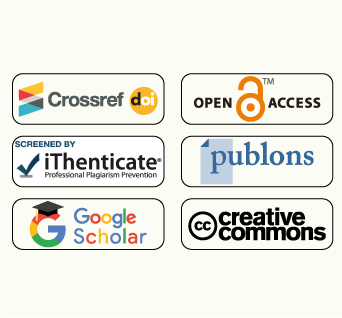Non-native English-speaking seafarers – an investigation into communicational challenges and consequent on high retention rates
Abstract
Abstract
Purpose: This study investigates the challenges faced by non-native English-speaking seafarers in the maritime industry that would affect their employability and rate of retention. The study aims at exploring strategies to elevate seafarers’ professional communicational skills, through quality education as per the Sustainable Development Goal (SDG) number four, and effective recruitment, retention and work diversity practices as per SDG number 8 (Decent Work and Economic Growth) and SDG number 10 (Reduced Inequalities).
To accomplish this a sequential explanatory approach was employed that integrates quantitative and qualitative methodologies. Initially, quantitative data is collected through online questionnaires, providing preliminary insights into generic communicational challenges among non-native English-speaking seafarers. These insights guide the selection of participants for subsequent qualitative semi-structured interviews with seafarers and maritime employers. The qualitative data is analyzed utilizing a commercial NVivo software, focusing on thematic coding and correlation analysis.
The study identified significant psychological, technical and cultural barriers to effective English communication among maritime students, including fear of criticism, lack of interest, and difficulties in understanding accents. Recommendations included integrating advanced technological tools, interactive learning methods, and broader incorporation of English across maritime courses. The analysis revealed the crucial role of technical skills and English proficiency, with implications for recruitment, training, and workplace inclusivity. Technological innovations and comprehensive training approaches are suggested to address these challenges and improve seafarers’ employability and career development.
Received: 18 August 2024
Accepted: 07 October 2024
Published: 15 October 2024
Keywords
Full Text:
PDFReferences
Arulnayagam, A. (2020) ‘Addressing the Voice of Women in Marine and Maritime Industry’, Scientific Research Journal, 08(04). Available at: https://doi.org/10.31364/scirj/v8.i4.2020.p0420763.
Belcher, P. (2003) Women seafarers: Global employment policies and practices. London: ILO.
Bhattacharya, Y. (2015) ‘Employee Engagement as a Predictor of Seafarer Retention: A Study among Indian Officers’, Asian Journal of Shipping and Logistics, 31(2). Available at: https://doi.org/10.1016/j.ajsl.2015.06.007.
Devereux, H. (2017) The impact of the organisation of work and employment at sea on the occupational health, safety and well-being of seafarers. Doctoral. Cardiff University.
Dominguez-Péry, C. et al. (2021) ‘Reducing maritime accidents in ships by tackling human error: a bibliometric review and research agenda’, Journal of Shipping and Trade, 6(1), p. 20. Available at: https://doi.org/10.1186/s41072-021-00098-y.
Fan, L. et al. (2017) ‘The communicative competence of Chinese seafarers and their employability in the international maritime labour market’, Marine Policy, 83. Available at: https://doi.org/10.1016/j.marpol.2017.05.035.
Heirs, S. and Manuel, M. (2021) ‘Sustainable maritime career development: A case for maritime education and training (met) at the secondary level’, TransNav, 15(1). Available at: https://doi.org/10.12716/1001.15.01.08.
Horck, J. (2010) ‘The gender perspective in maritime education and training’, WMU Journal of Maritime Affairs, 9(1). Available at: https://doi.org/10.1007/BF03195168.
John, P., Brooks, B. and Schriever, U. (2017) ‘Profiling maritime communication by non-native speakers: A quantitative comparison between the baseline and standard marine communication phraseology’, English for Specific Purposes, 47. Available at: https://doi.org/10.1016/j.esp.2017.03.002.
Kitada, M. (2017) ‘Female captains and their leadership: Human factors in the shipping industry’, in Advances in Intelligent Systems and Computing. Available at: https://doi.org/10.1007/978-3-319-42070-7_114.
Meštrović, T. et al. (2024) ‘Challenges for the Education and Training of Seafarers in the Context of Autonomous Shipping: Bibliometric Analysis and Systematic Literature Review’, Applied Sciences, 14(8), p. 3173. Available at: https://doi.org/10.3390/app14083173.
Ölçer, A.I. et al. (2023) Transport 2040 : Impact of Technology on Seafarers - The Future of Work. Malmö. Available at: https://doi.org/10.21677/230613.
SALAH ELDIN FARAG and MAGDY ALI ELASHKAR (2016) ‘Improvement of Maritime Education and Training Quality in Egypt To Compete in International Labor Market’, International Journal of General Engineering and Technology (IJGET), 5(6).
Thomas, M. and Bailey, N. (2009) ‘Out of time: Work, temporal synchrony and families’, Sociology, 43(4). Available at: https://doi.org/10.1177/0038038509105411.
UNCTAD (2023) ‘UNCTADstat - Maritime profile: Afghanistan’. Available at: https://unctadstat.unctad.org/countryprofile/maritimeprofile/en-gb/004/index.html.
DOI: http://dx.doi.org/10.21622/MRT.2024.03.2.967
Refbacks
- There are currently no refbacks.
Copyright (c) 2024 Soha Heikal, Alaa Abdelbarry, Ahmed Swidan, Mohamed Khattab, Shadi Alghaffari
Maritime Research and Technology
E-ISSN: 2812-5622
P-ISSN: 2812-5614
Published by:
Academy Publishing Center (APC)
Arab Academy for Science, Technology and Maritime Transport (AASTMT)
Alexandria, Egypt
mrt@aast.edu

